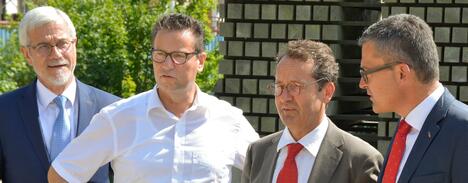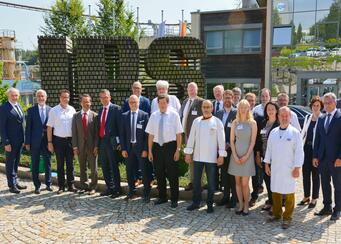JRS Life Science - Healthy Diet / Food for the Future

Visit of the Delegation to Minister Peter Hauk, District Administrator Pavel, and Member of German Bundestag Kiesewetter at JRS
District Administrator Klaus Pavel invited Peter Hauk, Minister for Rural Areas and Consumer Protection, to visit the district Ostalbkreis on 1st of August 2017.
One station is JRS, J. Rettenmaier & Söhne in Rosenberg-Holzmühle. With "Life Science - Healthy Nutrition / Food for the Future" being the key topic, the dialogue with the politicians deals with current issues and perspectives on a healthier diet - not only in modern industrial societies.
Obesity, diabetes, cardiovascular disease, and colorectal cancer are increasingly becoming a threat to an ever-growing world population, which is also getting older. The Federal Statistical Office estimates the resulting cost burden for health care systems at more than EUR 93 billion a year in Germany alone!
The causes are inter alia the cultural and societal change of the modern world: in addition to lack of exercise, changing dietary habits with excessive energy intake and a lack of fiber share lead to the serious health problems.
JRS is the world's largest producer of vegetable fiber concentrates for an innovative, health-oriented approach to address these problems in a sustainable manner: the JRS fruit, vegetable and cereal fiber product range with its specific characteristics is perfectly suited for modern, savory food preparations with fiber enrichment, e.g. in pastry, noodles, cereals, meat products, dairy products, beverages ...
Dietary fibers play an extremely important role in human nutrition, which in the last century was only been gradually understood in its entire scope.
Today, research and teaching around the globe are concerned with the complex role that dietary fibers play for human metabolism or saturation. Prof. Dr. Andreas Pfeiffer, for example, from the Charité in Potsdam, has been researching the influence of dietary fiber deficiencies on the development of type 2 diabetes with his team for many years. He concludes from his findings that the enrichment of modern, processed foods with insoluble fiber leads to a 15 to 20% reduced diabetes risk.
However, fibers can even do more: their swelling, saturating effect actively helps to reduce the excessive energy supply of many finished products. In general, dietary fibers also ensure a better, controlled digestion.
The German Society of Nutrition (DGE) recommends the intake of at least 30 grams of dietary fiber per day. Diabetic specialist associations even rate 40gr daily. The reality in Germany looks quite different: the average German man consumes 18gr per day averagely in the normal, daily diet, women only 19gr. 100 years ago it was almost 100gr / day, according to the nutrition expert Prof. Hauner from the University of Munich. It is not surprising that Type 2 diabetes and other forms of prosperity spread ephedrine-like.
However, it is not as simple as it sounds to achieve the recommended daily amount of dietary fibers in the daily diet. In particular, the popular white wheat flour, from which a large number of today's finished products are produced, pay little attention to the daily fiber account. Consumers also demand savory foods. With the VITACEL® Food Fiber Concentrates, JRS provides the perfect solution for fiber-rich foods.
With its own application equipment, e.g. an in-house bakery, a sausage kitchen, a dairy and beverage laboratory and various analytical laboratories, the JRS application team supports customers from the food industry in the field of recipe development and product optimization.
10 production plants in Europe and America focused on food fibers, provide the various markets with the highest quality standards.
The "green concept" of JRS: CEO Josef Otto Rettenmaier representing the owner family, has been developing this business field for more than 140 years with Rettenmaier’ian mill tradition, supported by the idea of a sustainable use of plant raw materials. Originated from a conventional oil and cereal mill, JRS is still regarded as an innovative industrial company for a consistent, waste-free resource use of the valuable, renewable plant-derived substances.
With highly specialized production sites, e.g. for its high requirements for food, pharmaceutical, or cosmetic products, JRS is looking for proximity to all important industrial centers around the world - or follows the necessary plant sources.
As an owner-managed, independent family-owned group, JRS can pursue a long-term, sustained corporate philosophy based on independence and independent strategy development.
JRS is firmly rooted in the region with its corporate center. The company concept is consistently globally oriented.

About the Event in Rosenberg
The event at JRS was launched with a company presentation by Managing Director Josef Otto Rettenmaier. He presented the entire range of applications of JRS Plant Fiber Technology in all areas of the pharmaceutical industry, plastics, paper, filtration, and building chemistry, before discussing the specifics of JRS food fibers in the JRS Business Unit Food.
The company's specialty team picked up the ball and deepened the information on the many health perspectives that JRS has to offer in the modern food industry. In order to illustrate today's possibilities of tasty fiber enrichment in a wide variety of food products, a small, tasty lunch menu with fiber-enriched products was presented parallel to the expert lectures: Swabian meat loaf and bratwurst, noodle salad, spelt bread, cake, dietary fiber drink.
In the ensuing discussion with Minister Peter Hauk, District Administrator Klaus Pavel, Roderich Kiesewetter, Member of the German Bundestag and other members of the delegation, the focus was set on opportunities and ways to position JRS food fibers even more effectively as weapon against food-related civilization diseases.
Josef Otto Rettenmaier expressed the desire to take part in an extensive information and education work on dietary fibers and their health benefits. At the same time, further support is needed to deal with the EU bureaucracy in declarations, and product approvals. Here, he sees major challenges for medium-sized companies that are launching new innovative products. In order to facilitate this, he also hopes for better support from politics and administration.
Minister Hauk was visibly impressed by the work of JRS and its activities in the area of food fibers. He emphasized the importance of such modern concepts, which have played an important role as future-oriented innovators for the attractiveness of Baden-Württemberg as location.
Together with District Administrator Pavel, the idea of bringing together all the necessary bodies and parties with regard to official and political support arose in order to find out how to improve promoting the innovation projects of JRS. Minister Hauk expressed his personal commitment and encouraged JRS to continue its innovative path.




